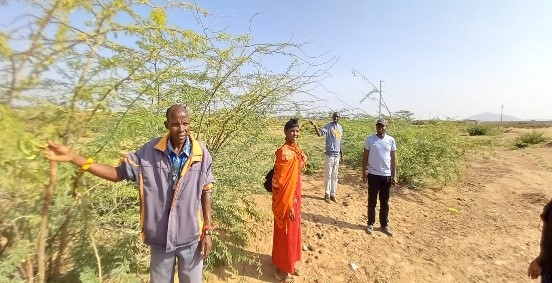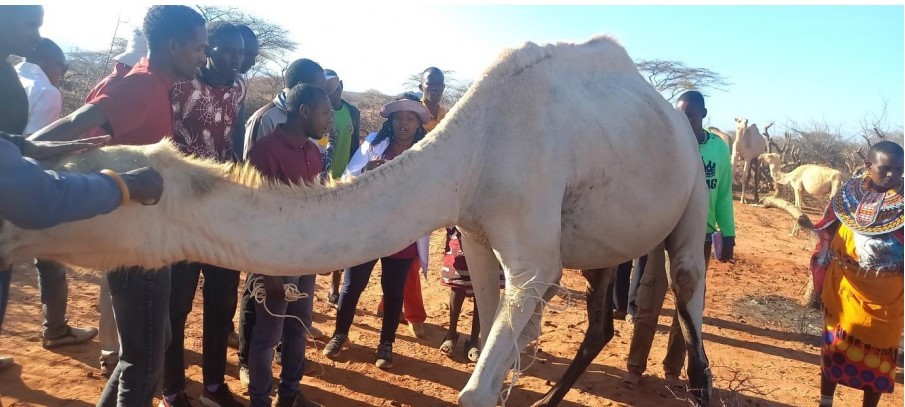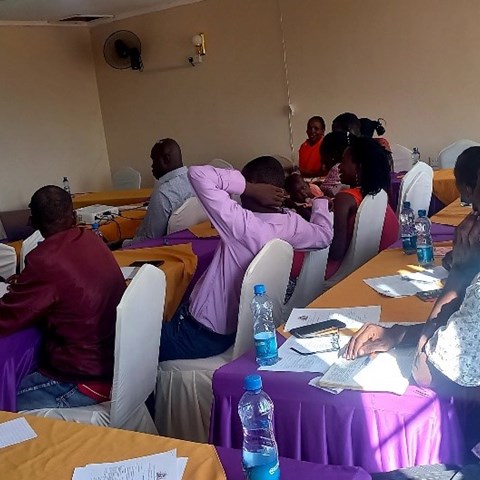The "Science-based and co-produced transformative rangeland management practices" (TRAMAP) project's overarching objective was to empower pastoralists and agro-pastoralists to enhance agricultural productivity while preserving landscape ecosystem functions through collective action and gender-sensitive adoption of sustainable practices. This initiative aimed to achieve the goals through various specific objectives, including capacity building, knowledge co-production, and stakeholder networking.

A farmer identifies camel forages with other camel keepers during field visit in Samburu East (Photo by J. Mutune, 2023)
One important part was the training of 19 Trainers of Trainers (ToTs) on camel husbandry, health, and welfare. This collaborative learning initiative brought together camel keepers to exchange indigenous knowledge and scientific insights, equipping them with essential skills for improving camel productivity, disease management, marketing, and value addition. The ToTs are expected to disseminate this knowledge widely, promoting household resilience against climate variability and enhancing food security in Samburu County. Another significant part was the capacity strengthening of Mr. Nathaniel Tum, an addition to the County government's Livestock Department.

Peer-to-peer learning on camel husbandry practices in Samburu East (photo by J. Mutune, 2023)
The project had a large focus on the species Vachellia reficiens and how local pastoralists and farmers can manage to live and work around it. The local community describes V. reficiens as a ‘land grabber’ because where the species grow, there are no pastures for livestock and wildlife and creates soil surface crusting which exacerbates flooding, soil erosion and low herbaceous plant biodiversity. The reduced pastureland by V. reficiens aggravates pasture scarcity and conflicts among pastoralists. The control of this invader species is to reduce the density of the population. The TRAMAP team build capacity of the community and extension workers in Samburu East on mechanical control. The cleared areas are then reseeded with rangeland grasses after installing rainwater harvesting structures.
 TRAMAP project – Rich picture exercise at Lerata B, Samburu East Sub-County
TRAMAP project – Rich picture exercise at Lerata B, Samburu East Sub-County
The establishment of demonstration sites for hands-on learning purposes underscore the project's sustainability beyond its lifespan. The commitment of the County government to maintain these sites for future training activities highlights a promising partnership between local authorities and the community. By empowering local communities, building institutional capacity, and promoting knowledge exchange, this initiative represents a step forward in enhancing livelihoods and conserving natural resources in the region.
Read more about the species Vachellia reficiens



 TRAMAP project – Rich picture exercise at Lerata B, Samburu East Sub-County
TRAMAP project – Rich picture exercise at Lerata B, Samburu East Sub-County
 Veronica Brodén Gyberg, Dr
Veronica Brodén Gyberg, Dr